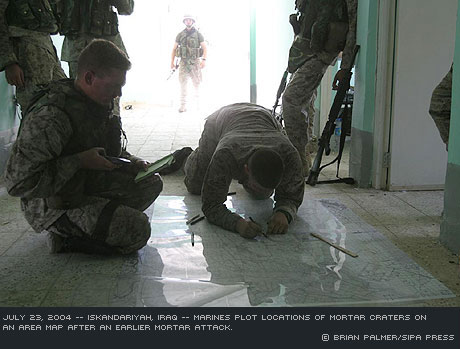The
last mortar round hit around 1315. Eight or more rounds landed during
the 15-minute attack. Marines and soldiers lingered at the shelters
for a few more minutes, then staggered back to their barracks. Capt.
Spaulding, a wiry (polite code for "not large") officer
who tends toward listening and consensus-building rather than the
standard USMC bellow, gathered his staff to pinpoint the source of
the mortar rounds. They spread out an area map on the floor inside
the closest building and pored over it. Other Marines gathered around
them to vent, speculate, and simply to be near one another.
Some men slammed the Army for not adequately securing the area surrounding
the camp and the power plant that sits in its midst. They also blamed
the Army for not aggressively stalking the forces that launch such
attacks. "They're more interested in hot chow and hot showers"
than in fighting, spit a senior noncommissioned officer. The 24th
MEU's ground combat element, he insisted, could crush the Iraqi adversaries
with a sustained and lethal application of firepower and skillful
maneuver -- if they were allowed to. His suggestion: immediately after
an attack, shoot mortars and artillery into the zones identified as
the source of fire. That might kill innocent Iraqi civilians, he averred,
but it would encourage the local population to blow the whistle on
the forces launching the attacks. That's the dominant, though not
universal, opinion I have heard here.
To minimize civilian casualties, the Pentagon drafted rules of engagement
that dictate the conditions under which US forces can shoot back in
populated areas (conditions embedded reporters are not permitted to
reveal). They were not met in this instance, so Marine and Army mortars
did not return fire. (An armed team, however, was sent out from the
base to hunt for the shooters.) "This is politics, not war,"
said an exasperated lieutenant. "This is politics. That's the
problem."At 1428, a sweaty, grim-faced, flak-jacketed Marine
entered the building. He spoke quietly and briefly with Master Sergeant
Benjamin.
"Sullivan died," the Master Sergeant said. "Sullivan
passed away." The Master Sergeant, a career Marine, six feet
and three inches of sinew and right angles, crossed himself. The swaggering,
ball-scratching, Type-A Marines around him retreated into themselves.
Later, the leader of Lance Corporal Sullivan's unit, a young lieutenant,
visited Capt. Spaulding and the Master Sergeant to ask whether there
is a standard letter one sends to the family of a Marine killed in
action. No, Captain Spaulding told him, there isn't. He advised the
lieutenant to tell Sullivan's family how much the Lance Corporal meant
to his squad mates and what he contributed to the unit. Don't dwell
on the explicit facts of his death, the Captain added.
The Marine Lance Corporal who bellowed at me in the Battalion Aid
Station, Ricky Funderburk, found me and apologized the following day.
Funderburk, a 21-year-old from Milton, Florida, with roughcut dirty
blond hair and restless eyes, told me that he realized I was doing
my job by taking photos during the attack. I replied that I understood
his anger in that terrible instant. He was protecting the dignity
of a friend.
"I had friends that passed away last year, but not that close.
Until Vince," said Funderburk, softly, just yards from where
the rounds landed. "It's hard to think back on it," he said
weighing his words, still visibly shaken, but answering my questions
respectfully. "In the long run, I think it will make me a better
person," he ventured. Thinking too much about Sullivan's death,
Funderburk continued, "will definitely always bring you down.
But it will also remind you of what can happen to you and make you
do your job that much better and that much safer." |

